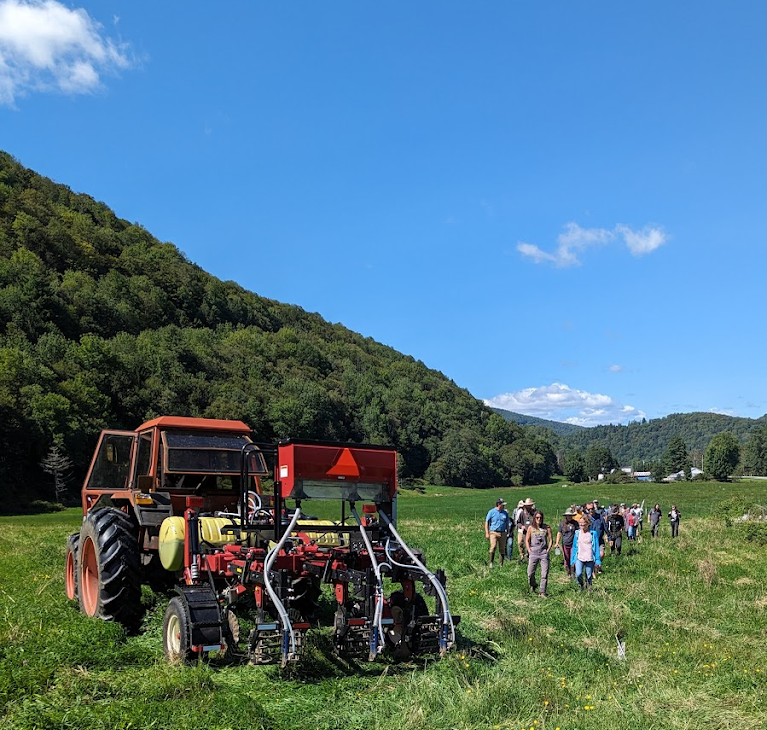
Land Care Cooperative & LandWEB / Company Spotlight
Abe Collins, founder of Land Care Cooperative (LCC) and LandWEB, is on a mission to support farmers working to heal Vermont’s watersheds, soils, and biodiversity.
Vermont, like much of the world, faces severe landscape degradation and water issues, the consequences of centuries of biodiversity loss and soil erosion.
Collins, who grew up in Rochester, Vermont, left the state at 18 to work with ranchers and Indigenous communities restoring desertified landscapes in the American West. The experience reshaped his view of land stewardship and showed him the potential of working in close partnership with those who live on the land.
“We were trying to figure out how to turn the desert back into healthy land,” said Collins in an interview with VCET. “Life was how you did that. You needed healthy plants and soil for the water to soak in and be held – and the grazing animals are the key tool.”
When Collins returned to Vermont, he became a dairy farmer, innovating grazing, land management, and landscape-feedback techniques. He also began exploring ways to finance large-scale restoration led by farmers and ranchers.
It soon became clear to Collins that a lasting impact would depend on grassroots leadership: farmers and communities organizing together to care for their land and watersheds.
In 2020, Collins co-founded Land Care Cooperative (“LCC”) with community leaders and 14 Vermont farms. The farmer-led cooperative is focused on building healthy, water-retaining soils, reducing flood risks, and promoting biodiversity.
“There is an alienated, erroneous idea that the only way that nature can heal is to remove the people from it,” said Collins. “Our work is about people embedded in the land, healing the land as we work on it, live in it and gain our sustenance from it.”
LCC members often convene to exchange knowledge, tools, and strategies to manage land effectively. Its sister organization, LandWEB, also provides scientific feedback using data to help members guide their efforts.
One core principle of LCC is to help Vermont communities facing urgent environmental challenges. Recently, LCC has worked with the Tri-Town Valley, which was devastated by flooding in 2011. The goal is to increase water retention, improve soil health, and build contour-compliant infrastructure to reduce the risk of future disasters.
LCC has also run watershed pilot projects on member farms. One ongoing project involves using Lactic Acid Bacteria (LAB)-based composting techniques to improve livestock health and yields while preventing flu outbreaks. These methods have shown positive results so far.
Other initiatives include planting diverse seed mixes on farms through the BloomTrain initiative, improving tools like the Ripsower to build topsoil, and continuing to improve LandWEB to track environmental data on farms.
“We’ve been standing up a new story: that farmers can rapidly heal land by growing topsoil and increasing biodiversity,” said Collins. “That is the key offering to our communities, which need water, food security, and reduced natural disasters.”
Restoring soil and biodiversity is a massive challenge that requires significant investment in knowledge, effort, and resources beyond just a few “best management” practices. To date, LCC has been mostly funded by contributions from its founding members, but in February, it secured a $100,000 convertible note. This is a key step as they prepare for a larger investment series to expand their services.
LCC joined VCET in 2019 to access mentorship and technical support. Before that, Collins struggled to connect with the right technical experts in Vermont.
“The water cooler meetings [at VCET] are super productive,” said Collins. “The informational resources, coaching, and guidance we’ve gotten from people like Dave and Sam – it’s been great.”
Collins believes LCC’s approach is replicable: communities can learn from one another, spreading restoration efforts beyond the state’s borders.
LCC’s ultimate vision is to leave future generations with deep, healthy topsoil and resilient watersheds – not just in Vermont, but beyond. Collins encourages anyone interested in partnering or investing to reach out.
“The people on the land are ready and very well-equipped. We just need additional resources to get the flywheel turning,” said Collins. “It comes down to people on the land undoing the ravages of the last few hundred – and even a few thousand – years.”
To support their mission, contact Abe at abenewsoil@gmail.com. You can also learn more here.



